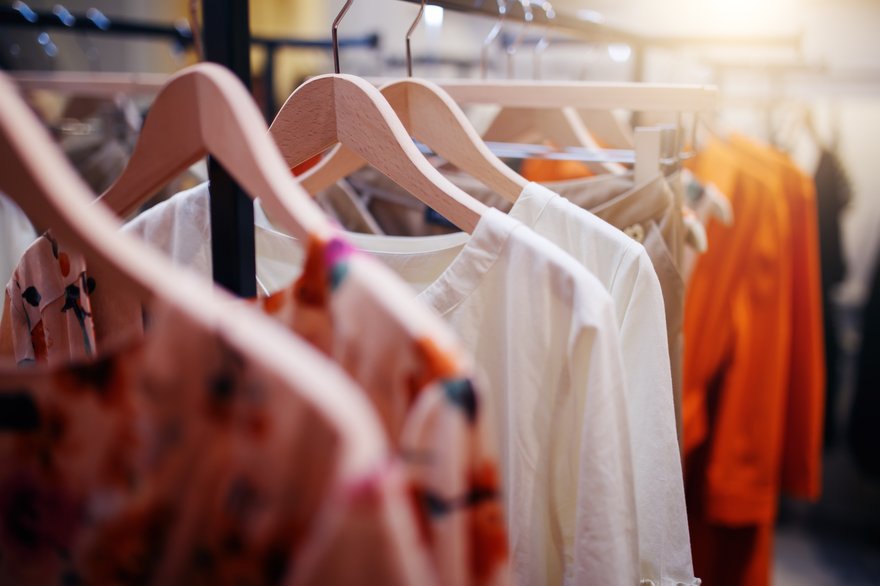According to the U.S. Census Bureau, the apparel industry was one of the hardest-hit sectors of the economy in 2020. Retail sales at clothing and accessories stores fell by 26% from the previous year. But consumer spending on apparel is rallying and is up more than 60% year over year heading into the final quarter of 2021.
Trends such as e-commerce and athletic-inspired attire are reshaping the status quo. However, it’s worth noting that apparel overall is not a high-growth segment of the economy. The fast pace of 2021 growth isn’t likely to repeat in 2022 and beyond.

Clothing is a basic staple, so this isn’t an industry benefiting from prevailing secular trends. However, athleisure was already a popular clothing theme prior to the COVID-19 pandemic -- and one that looks culturally cemented into place now that remote work is normalized. The same goes for e-commerce, which was already growing and got a further boost from the pandemic.
Investors should look for apparel companies that have been making the most of these two trends and gobbling up market share as a result. The best apparel companies are much more than just clothing manufacturers.
Apparel stocks to watch in 2024
Here are the top apparel stocks to buy in 2024 and beyond:
| Company | Market Capitalization | Description |
|---|---|---|
|
Nike (NYSE:NKE) |
$198.2 billion | The world’s largest shoe and sportswear manufacturer. |
|
Skechers (NYSE:SKX) |
$7.2 billion | A former upstart shoe company that has built a significant global fan base. |
| lululemon athletica | $40.0 billion | Fast-growing athleisure brand that has built a sizable digital business. |
| Stitch Fix | $504.2 million | Online retailer that uses machine learning software to optimize the styles it sends customers. |
| Farfetch | $2.1 billion | Leading the charge in bringing luxury and high-end goods to the internet. |
|
The TJX Companies (NYSE:TJX) |
$94.4 billion | A treasure hunt-style experience and top oversupply partner for retailers and manufacturers. |
|
Target (NYSE:TGT) |
$75.2 billion | Big-box store that’s disrupting the department store industry and scooping up apparel dollars. |
1. Nike
Nike needs little introduction. The global footwear and apparel leader has been a major part of sports and pop culture for decades and continues to pioneer trends in fashion, athletic gear, and everyday street clothing. Nike's growth is resilient, too. After experiencing a minor revenue decline at the start of the pandemic, the company quickly returned to expanding its sales. The international brand power and consumer awareness of the Nike “swoosh” are forces to be reckoned with.
Nike is succeeding in e-commerce and its direct-to-consumer business. By forging valuable relationships directly with its customers, the sports apparel company is showing how a textile and apparel manufacturer can also successfully thrive as a retailer in this digital-first era.
Nike expects digital sales to account for half of its total sales by fiscal year 2025, up from about 35% in 2021. The company is forecasting revenue growth percentages in the high single digits to low double digits in each year through 2025, although supply chain issues due to effects from the pandemic are expected to cap the company’s growth in late 2021 and into 2022.
2. Skechers
Skechers, one of Nike’s biggest competitors, also struggled at the start of the pandemic but quickly rallied. The athletic shoemaker is returning to producing double-digit percentage revenue growth.
Sneaker culture is alive and well around the globe, and Skechers is building out its e-commerce capabilities and worldwide distribution channels. Skechers has especially succeeded at increasing brand awareness outside of the U.S., where it earns almost 60% of its total revenue. That's a higher proportion than for any of its peers and has significantly contributed to the company's revenue growth. Producing on-trend styles at value prices has also been a key to Skechers' international success.
Skechers is still viewed as the underdog in the shoe business even though the company is considered a top lifestyle brand in many markets. This is an underappreciated business and a great value play.

3. lululemon athletica
Lululemon athletica began as a pioneer of sorts with women’s yoga attire and significantly helped to popularize athletic-inspired apparel for everyday wear. Building on its early success, the company now has full lines of clothing for women, men, and children.
Lululemon's direct-to-consumer business accounts for more than 40% of total revenue, a real differentiator for the clothing company as it has forged a relationship directly with its users instead of relying heavily on retailers. The company has been producing double-digit revenue growth, and it is likely to continue to do so even as in-person shopping makes a comeback.
In 2020, lululemon also directly entered the fitness industry with its $500 million acquisition of the at-home health tech company Mirror. This leading apparel company now offers investors exposure to both athletic clothing and the future of fitness.
4. Stitch Fix
Stitch Fix has made a name for itself in the nascent online personal styling space. Founded in 2011, this company has quickly grown to be a leader in online retail. It uses machine learning on information collected from customers to help stylists curate personalized clothing and accessory options. Customers keep what they like and send back what they don’t want, giving Stitch Fix’s AI software algorithms more data to make the service even better.
More recently, the company has branched out and offers its customers the ability to shop and buy from its clothing collections directly rather than just receive curated items. The new service, called Stitch Fix Freestyle, could expand on the company’s appeal to consumers. As the economy gradually reopens and people return to the office, take vacations, and generally spend less time at home, Stitch Fix is expecting its business to continue expanding at a double-digit percentage pace.
With consumers getting more comfortable buying clothing online, this small apparel and retail technology company has plenty of opportunities to grow.
5. Farfetch
The owner of the Italian luxury fashion upstart Off-White, Farfetch is thriving, largely due to its focus on e-commerce. The company operates an online marketplace for third-party luxury retailers, provides e-commerce software services for luxury labels to build their own online presence, and has a direct-to-consumer and order fulfillment unit to help brands bridge the gap between in-person and online shopping. It also has established a joint venture with Alibaba (BABA -1.0%) to bring its marketplace to mainland China, where demand for luxury goods is high.
The high-end apparel and accessories industry has been reluctant to embrace e-commerce, although COVID-19 significantly accelerated the transition. Farfetch is quickly emerging as a luxury e-commerce leader and anticipates strong double-digit revenue growth in 2021 and beyond.
6. The TJX Companies
In the emerging digital era, The TJX Companies -- parent company of T.J. Maxx, Marshalls, and HomeGoods -- would seem to be an unlikely winner. The retailer is highly reliant on sales from brick-and-mortar stores, which afford a treasure hunt-style shopping experience, and it has unpredictable inventory because it sources excess goods from manufacturers and retailers. Both of these qualities are not particularly well-suited for e-commerce.
While the company struggled through the pandemic, consumers are increasingly shopping in person and still love getting deals on interesting finds. TJX's sales are quickly rebounding, and the company continues to benefit, even in the digital era, from manufacturers' needs to manage (and monetize) their excess inventories. TJX stock is another long-term value play, and it pays a decent dividend to boot.
7. Target
Yes, big-box store Target is an apparel company. In fact, it’s a fast-growing clothier. Sales of Target's in-house clothing brands for men, women, children, and babies soared in 2020 as consumers increasingly relied on the retail chain for everyday items, including clothes, during the pandemic.
Target increased its apparel sales in 2020 and is doing the same again in 2021. Given that the apparel industry was in decline last year, Target’s boost in clothing sales implies that the retailer gained substantial market share.
Target stores are widely accessible, with most of the U.S. population living within a few miles of one. Shoppers can find everything they need in just a single trip (or click), and the company's shipping and delivery operations are a further differentiator. Target may not seem like an apparel company, but the retailer is succeeding at making and selling everyday clothing.
Related investing topics
Should you add apparel stocks to your portfolio?
The apparel industry isn’t the most exciting one out there. Nevertheless, it’s being disrupted like never before by digital commerce trends and a work-from-home movement that favors athleisure and athletic-inspired attire.
Investors interested in buying apparel stocks should focus on those companies deriving the most profits from e-commerce and sportswear since e-commerce especially is only becoming more popular.









